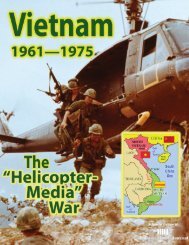Veterans Magazine 2021 - The War in Korea
- No tags were found...
You also want an ePaper? Increase the reach of your titles
YUMPU automatically turns print PDFs into web optimized ePapers that Google loves.
<strong>The</strong> <strong>War</strong> <strong>in</strong> <strong>Korea</strong><br />
(1950 – 1953)<br />
By: Col. H. Avery Chenoweth<br />
USMCR Ret. (Perry)<br />
Right after World <strong>War</strong> II, former ally, the Soviet Union,<br />
dropped an “iron curta<strong>in</strong>” across Europe and challenged the<br />
West to a “Cold <strong>War</strong>.” Five years later, to test the West’s will<br />
to confront Soviet encroachment, it ordered its communist<br />
puppet, North <strong>Korea</strong>, to <strong>in</strong>vade free South <strong>Korea</strong> <strong>in</strong> a surprise<br />
attack across the 38th Parallel on June 25, 1950.<br />
Just freed from the Japanese, South <strong>Korea</strong> was a backward<br />
country of reek<strong>in</strong>g rice paddies, thatched-roof huts, and no<br />
paved roads or two-story build<strong>in</strong>gs, except <strong>in</strong> a few cities. Its<br />
meager army, weak and untra<strong>in</strong>ed.<br />
Tough President Harry Truman unhesitat<strong>in</strong>gly ordered sparse<br />
Pacific U.S. air components <strong>in</strong>to battle and conv<strong>in</strong>ced<br />
the United Nations Security Council to approve the U.N.’s<br />
<strong>in</strong>volvement to support the United States <strong>in</strong> sav<strong>in</strong>g the<br />
vulnerable fledgl<strong>in</strong>g democratic country.<br />
With worn out weapons from World <strong>War</strong> II, it took three<br />
years of bloody fight<strong>in</strong>g, mostly by seven American <strong>in</strong>fantry<br />
divisions support<strong>in</strong>g weaker South <strong>Korea</strong>n divisions<br />
at a cost of over 38,000 Americans killed with 8,000<br />
still miss<strong>in</strong>g. Fight<strong>in</strong>g ended 68-years <strong>in</strong> July 1953 <strong>in</strong> a<br />
ceasefire (Armistice) with the South <strong>Korea</strong>n army and a U.S.<br />
mechanized division poised face-to-face on a Demilitarized<br />
Zone (DMZ) aga<strong>in</strong>st a million-man North <strong>Korea</strong>n communist<br />
army led by a crazed dictator—still today <strong>in</strong> an unresolved<br />
“State of <strong>War</strong>”—with both North <strong>Korea</strong> and Ch<strong>in</strong>a!<br />
Incredibly—thanks to America, with the United Nations’<br />
token assistance—while North <strong>Korea</strong> still rema<strong>in</strong>s a dismal,<br />
backward, enslaved and starv<strong>in</strong>g country—free and<br />
democratic South <strong>Korea</strong> has grown <strong>in</strong>to one of the richest<br />
economies <strong>in</strong> Asia. Its capital city, Seoul—which has been<br />
conquered and rendered <strong>in</strong>to rubble three times by the<br />
communist North—now leads one of the most impressively<br />
modern, wealthy and technologically top countries,<br />
<strong>in</strong> league with Ch<strong>in</strong>a, Japan, Russia, the U.S., Brita<strong>in</strong>,<br />
Germany—and unlike any other Asian nation, has a large<br />
Christian population.<br />
As a Mar<strong>in</strong>e <strong>in</strong>fantry officer, I spent all of 1951 lead<strong>in</strong>g rifle,<br />
mach<strong>in</strong>e gun, and recoilless rifle platoons <strong>in</strong> combat and<br />
witnessed, and later wrote about, a lot of history that has<br />
s<strong>in</strong>ce been sanitized and revised.<br />
<strong>The</strong> first part of the<br />
<strong>Korea</strong>n <strong>War</strong> was an<br />
outright debacle. <strong>The</strong> U.S.<br />
had downsized all of its<br />
armed forces so quickly<br />
immediately after the<br />
end of WWII that <strong>in</strong> 1950,<br />
only the 28,000-man 1st<br />
Mar<strong>in</strong>e Division and its<br />
Air W<strong>in</strong>g were capable of<br />
combat. All six 10,000-<br />
man U.S. Army divisions<br />
thrown <strong>in</strong>to combat got<br />
clobbered and wiped<br />
out as untra<strong>in</strong>ed, soft,<br />
poorly led, draftee<br />
replacements—some<br />
never hav<strong>in</strong>g even fired a<br />
rifle!—were fed piecemeal<br />
back <strong>in</strong>to them.<br />
1 st Lt. Avery Chenoweth USMCR, <strong>Korea</strong> 1951<br />
After <strong>Korea</strong>, he rema<strong>in</strong>ed active <strong>in</strong> the Reserves,<br />
serv<strong>in</strong>g <strong>in</strong> Vietnam and Gulf wars, became<br />
a noted military historian and combat artist,<br />
retired at rank of colonel.<br />
In the third month of the war, had the Mar<strong>in</strong>e division not<br />
rescued the trapped remnants of the U.S. Eighth Army and<br />
South <strong>Korea</strong>n units driven <strong>in</strong>to a f<strong>in</strong>al defense perimeter<br />
at Pusan at the southern tip of the country—and then, on<br />
September 15, pulled off the last amphibious <strong>in</strong>vasion <strong>in</strong><br />
history beh<strong>in</strong>d the enemy l<strong>in</strong>es and recaptured the capital,<br />
Seoul—the North <strong>Korea</strong>ns would have won the war hands<br />
down. A month later, Ch<strong>in</strong>a entered the war, throw<strong>in</strong>g the<br />
American-UN forces <strong>in</strong>to another panicked “bug-out” retreat.<br />
Only the Mar<strong>in</strong>e division reta<strong>in</strong>ed its unit <strong>in</strong>tegrity, sav<strong>in</strong>g<br />
remnants of Army 7th and 3rd divisions while destroy<strong>in</strong>g 12<br />
surround<strong>in</strong>g Ch<strong>in</strong>ese divisions as it withdrew <strong>in</strong> a two-weeklong<br />
December battle <strong>in</strong> sub-freez<strong>in</strong>g temperatures from<br />
the frozen Chos<strong>in</strong> Reservoir <strong>in</strong> North <strong>Korea</strong>; one of the most<br />
<strong>in</strong>credible feats <strong>in</strong> the annals of warfare.<br />
<strong>The</strong> f<strong>in</strong>al two years were static WWI trench-type warfare at<br />
the DMZ. <strong>Korea</strong> was the great General Douglas MacArthur’s<br />
“Waterloo.” In 1951, President Truman relieved him of his<br />
command due to misjudgment and <strong>in</strong>subord<strong>in</strong>ation to<br />
Constitutional civil authority over the military. <br />
November <strong>2021</strong><br />
<strong>The</strong> WAR <strong>in</strong> KOREA<br />
5

















